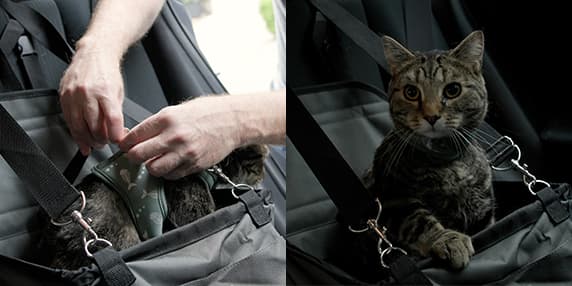Newsroom
Four paws and four wheels: ICBC and BC SPCA hit the road with pet safety partnership
July 03, 2025

Summer’s rolling in, and so are the road trips in B.C. As people pack up for beach days, cabin weekends, and cross-province adventures, ICBC and the BC SPCA have one important reminder: don’t forget about your four-legged passengers.
Whether you're heading out on a long haul or just dashing to the dog park, your pet’s safety matters. That laid-back pup or curious kitty still needs to be secured. A crash-tested harness or a firmly anchored hard-shell crate can prevent serious injuries—both to your pet and to everyone else in the vehicle—while also keeping distractions at bay.
Quotes:
“They trust us with everything, from belly rubs to big adventures,” said Kathleen Nadalin, ICBC road safety manager. “When we bring our pets along for the ride, it’s our job to make sure they’re safe and secure. It’s a simple act of love that also keeps everyone else in the vehicle out of harm’s way.”
"Many drivers consider a pet as part of their family," said Kim Monteith, BC SPCA manager of animal welfare. "And as with any loved one that rides in your vehicle, it’s important to take steps to keep your dog or cat seated, secure and safe during every drive."
Tips for keeping pets safe in cars:
1. Use a safety device to protect your pet. Loose animals can become a projectile in a crash, injuring themselves and others in the vehicle. Animals can also pose a safety risk for first responders, as a disoriented and injured animal may become aggressive or even cause another crash by running into traffic. The best options for securing your pet are harnesses/safety belts and hard-shell crates that are secured down. You can find pet harnesses/safety belts and crates at pet stores. Here are more tips to keep in mind:
If you’re using a harness/safety belt, make sure it fits properly and is easy to put on. Dogs should be able to stand, sit, or lay down comfortably, without having to brace themselves while you're turning, reversing or stopping. When buying a harness for your dog, look for ones that are crash-tested.
If you're using a crate, look for one that has been crash-tested. Don’t use a cardboard crate for cats. Crates should be secured by a seatbelt, cargo hooks, or placed by the rear seat to secure it in place. If unsecured, the crate can bounce around and even become a projectile in a crash.
2. Let your dog or cat be the ‘backseat driver’. Don’t let your pet sit on your lap. Pets are safest when secured in the back seat or cargo area of your vehicle. Additionally, the front of a vehicle can put pets’ safety at risk due to the potential deployment of an air bag, as is the case with children.
3. Prevent distraction by packing the essentials. Keep your pet happy by bringing food, water, dishes, bedding and toys for them. For road trips, it's a good idea to stock your vehicle with a pet first-aid kit. And plan for a pit stop every few hours – it's good for drivers and pets to get a break.
4. Keep pets inside the vehicle while driving. While it's tempting to let your dog hang his head out the window for the breeze, this can lead to eye injuries due to weather, heavy wind, fly debris or objects coming close to your vehicle. Disable your power windows to prevent your pet from accidentally opening a window, causing it to escape or having the window close on its neck. Additionally, an open window can be a pet at risk of falling out with a sharp movement or turn.
5. Secure your pet if travelling in the back of a pick-up truck. It’s illegal and dangerous to travel with an unsecured pet in the exterior of a truck. If you must transport your pet in the back of a truck, the safest method is in a secured crate in the centre of your truck box. Learn more on BC SPCA's website.
6. If you're not in the car, your pet shouldn't be either. Vehicles can heat up quickly with warm temperatures and this can quickly endanger your pet's health. Even a car parked in the shade with the windows cracked open can get hot enough to cause heatstroke or the death of an animal.
Visit the BC SPCA’s website or icbc.com for more safety tips.
Media contact:
604-802-9024
